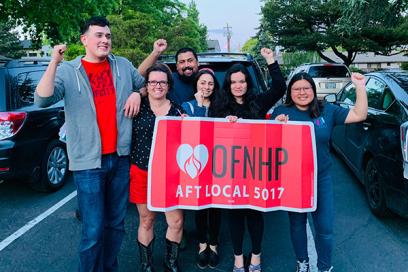A group of 30 behavior technicians and administrative staff at the Portland-East Center for Autism and Related Disorders voted decisively on May 23 to form a union with the Oregon Federation of Nurses and Health Professionals (OFNHP).
The Center for Autism and Related Disorders has more than 230 locations nationwide and claims to be the largest provider of autism services in the world. Workers at the East Portland location are breaking new ground with their successful union election. CARD Portland-East is the first center to unionize to improve working conditions and address the center’s alarming turnover rate.
“I really love this job, but I didn’t feel supported,” says Mica Rudich, a behavior tech who has worked at CARD for two years. “A year ago at CARD, people were unhappy, undervalued, underpaid, and we had one of the highest turnover rates I've ever seen. I heard one too many times that we couldn't do anything about it.”
That’s why CARD employees decided to organize for respect and support. They began organizing in 2018 and filed for a union election on April 26.
“The turnover rate interfered with the mission,” says Oscar Lemus-Arellano, a behavior tech who has worked at CARD for two years. “People would come in, stay for a few months and leave. But the longer you work with a child, the better the therapy you provide because you build a better rapport.”
“We’re doing this for the kids,” says Rudich. “We want them to have the highest-quality therapy we can provide. I have been inspired by the immense beauty and power of coming together, and I look forward to continuing this work that feels profoundly important to me.”
After the filing, CARD hired an anti-union consulting firm, Labor Diverse, to dissuade workers from voting to form their union. The firm used scare tactics, holding captive-audience meetings, following workers during breaks to disparage unions, and sending constant emails from the CEO and management about mandatory meetings.
“The meetings presented an anti-labor view of the union and tried to scare us into voting no,” says Lemus-Arellano.
“This was a battle fought on our company grounds,” says Rudich. “We worked for an entire year on organizing before we decided to go public. We wanted people to know what was to come.”
Lemus-Arellano agrees. “Being organized and taking things slow helped. Everyone was pretty well inoculated and once the anti-union campaign started, we communicated everything and addressed concerns daily to stay unified.”
“OFNHP is excited to welcome CARD caregivers to our fight to improve quality and access to behavioral health services,” says OFNHP President Adrienne Enghouse. “As healthcare workers, our working conditions are our patients’ healing conditions. When we have a voice at work through our union, we have more power to advocate for what our patients and their families need.”
[Adrienne Coles/OFNHP press release]

